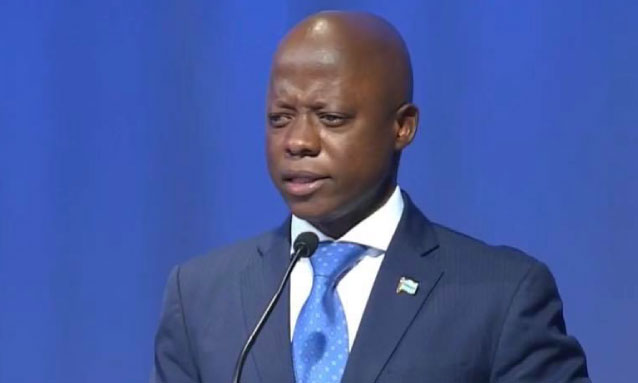Bridging Global Divides: Botswana’s Strategic Role in US-China Trade Dynamics. In an era defined by high-stakes geopolitics and economic power plays, Botswana has emerged as an unlikely yet effective moderator in the escalating trade tensions between the United States and China. The Southern African nation, known for its stability and diplomatic finesse, is leveraging its position to foster dialogue and mutual understanding between the world’s two largest economies.
A Diplomatic Balancing Act
At the heart of Botswana’s efforts lies its commitment to neutrality and multilateral cooperation. During a recent address at the African Continental Free Trade Area (AfCFTA) summit in Addis Ababa, Minister of Trade and Industry Mmusi Kgafela highlighted Botswana’s strategic approach: “Our goal is to ensure that Africa remains a partner of choice for all global economies. By fostering inclusive dialogue, we can bridge divides and promote equitable trade practices.”
Kgafela’s statement reflects Botswana’s broader vision of positioning itself as a mediator—not just within Africa but on the global stage. By participating in forums such as the AfCFTA and engaging with international stakeholders, the nation underscores its ability to navigate complex geopolitical landscapes.
Leveraging Africa’s Growing Influence
Africa’s role in global trade is expanding, and Botswana is keen to capitalize on this momentum. The continent’s vast resources and burgeoning markets have made it a focal point for both the US and China, whose investments often spark competition. Botswana’s diplomatic strategy seeks to channel this competition into collaboration.
“We need to view these tensions as an opportunity for Africa,” said Dr. Peter Letlhokwa, an economist at the University of Botswana. “By offering a neutral platform for dialogue, Botswana can attract investment while shaping the terms of engagement to benefit the region.”
Botswana’s Key Moves
Botswana’s recent initiatives reflect its proactive stance:
- Engagement Through the AfCFTA: By championing trade liberalization and regional integration, Botswana creates an environment where global powers can see Africa as a unified, strategic partner.
- Promoting Diversified Investments: Beyond diamonds, Botswana is inviting investments in sectors like renewable energy, agriculture, and technology. Both US and Chinese investors have shown interest, signaling confidence in the country’s governance and infrastructure.
- Strengthening Bilateral Relations: High-level visits and trade missions to Washington and Beijing underscore Botswana’s commitment to fostering balanced relationships with both nations.
Challenges and Opportunities
However, navigating these dynamics is not without challenges. Analysts warn that aligning too closely with one power could risk alienating the other. Botswana’s leadership must carefully manage perceptions while maintaining its sovereignty and strategic interests.
“Botswana’s advantage lies in its reputation for transparency and fairness,” said Letlhokwa. “This enables it to mediate without appearing biased, but the challenge will be to sustain this neutrality as the stakes increase.”
Looking Ahead
Botswana’s efforts to moderate US-China trade tensions highlight its ambition to play a more significant role in global diplomacy. As Africa’s influence grows, the nation’s strategic initiatives could pave the way for a more balanced and inclusive global trade system.
For Botswana’s entrepreneurs and businesses, this diplomatic approach offers a unique advantage. By positioning the country as a bridge between global powers, the government creates new opportunities for trade, investment, and innovation.
In a world increasingly defined by economic rivalry, Botswana’s measured and strategic diplomacy stands out as a model for smaller nations. By fostering collaboration over competition, the country not only strengthens its global standing but also paves the way for a more prosperous future—not just for itself but for the entire African continent.






